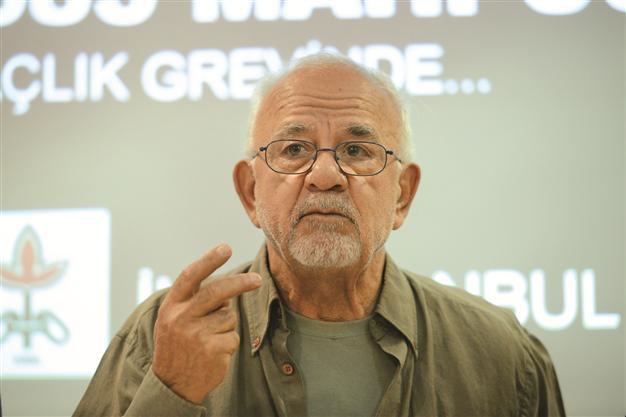Human rights activists seek ways to prison protests
ISTANBUL

Former head of the Turkish Medical Association Gençay Gürsoy urges hunger strikers to end their protests. DAILY NEWS photo, Emrah GÜREL
Human rights activists, intellectuals and representatives of minority groups came together at a meeting on Nov. 2 in Istanbul in order to draw a road map to deal with the ongoing hunger strikes in prisons.The attendants of the meeting, including lawyer Kezban Hatemi, the former chairman of the Turkey-EU Joint Parliamentary Committee Joost Lagendijk, a former head of the Turkish Medical Association Gençay Gürsoy, businessman İbrahim Betil, and southeastern province of Diyarbakır’s Sur district mayor Abdullah Demirbaş, together called on Turkish Prime Minister Recep Tayyip Erdoğan to find a way to put an end to the hunger strikes.
Demirbaş said this was the third wave of hunger strikes in recent Turkish history, referring to the two other hunger strikes that took place in 1996 and 2000.
“The mentality of different governments has remained the same in this country during these three waves,” he told the Hürriyet Daily News on Nov. 2.
If hunger strikes end in mass deaths, “affective breaks” will occur between Turkish and Kurdish people, said Demirbaş. “There is no doubt that the co-existence will decrease in Turkey. The supposedly democratic government would obviously be showing its dictatorial face,” he said.
Lawyer Kezban Hatemi, on the other hand, said she had faith in Erdoğan’s conscience.
“Our religious values emphasize the value of human life. Prime Minister Erdoğan’s position has importance, he must take the initiative.”
However, Joost Lagendijk said he opposed the method and added that other options should be adopted instead of hunger striking. This position contradicted with Professor Gencay Gürsoy, who said the inmates had no other option but to go on hunger strike.
“Some suspects have not stood on trial for five years. What else they could do to raise their voice,” he said.
Gencay also said the hunger strikes had reached a critical point as of yesterday, as previous strikes had only been held in a couple of prisons, but this time it was much more widespread. Some 683 inmates in 66 jails are currently on hunger strike.
Ezidi, Keldani and Syriac community representatives in the meeting also expressed their concerns about the strikes.
Yılmaz Demiray, from the Diyarbakır Ezidi Association, said their desire was for all inmates to stay healthy.
















